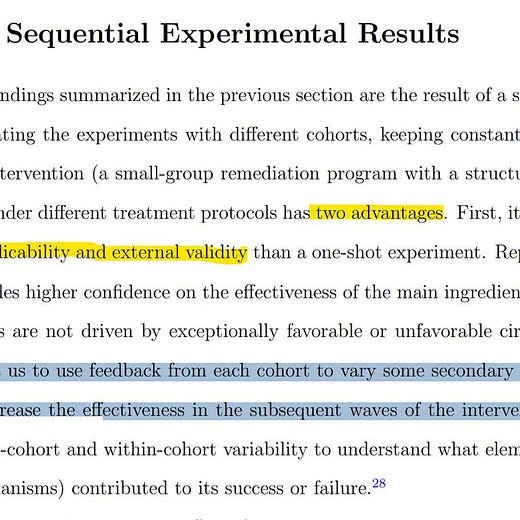Best of #econtwitter - Week of January 23, 2022 [1/2]
Jan 24, 2022
Welcome readers old and new to this week’s edition of Best of Econtwitter. Thanks to those sharing suggestions, over email or on Twitter @just_economics.
This is part one of two. Part two is here.
Paper summary threads

Shosh Vasserman@shoshievass
Very excited to share this new paper with the fantastic @ZiYangKang, out on NBER today.
Thread 👇 with an overview.
nber.org/papers/w29656

4:53 PM · Jan 17, 2022
46 Reposts · 296 Likes

Peter Hull@instrumenthull
New working paper w/@metrics52, @prof_parag, & @c_r_walt: "Race and the Mismeasure of School Quality"
dropbox.com/s/ba8ziznpeo72…
We use IV + centralized assignment data to study the relationship between school value-added, student race, and school performance ratings
A short 🧵:

3:26 PM · Jan 18, 2022
47 Reposts · 224 Likes

Tyler Ransom@tyleransom
Our paper "Divergent: The Time Path of Legacy and Athlete Admissions at Harvard" is now forthcoming at @J_HumanResource. We show that legacies and athletes (LA’s) saw their Harvard admission bonus *more than double* from 1996-2013 (Classes of 2000-2017).
doi.org
Divergent: The Time Path of Legacy and Athlete Admissions at Harvard
9:26 PM · Jan 17, 2022
14 Reposts · 72 Likes

Robert Dur@DurRobert
Studying economics reduces the risk of getting into financial problems:
🔹risk of loan default is 50% lower in the long run
🔹reduction is associated with change in financial behavior, not with change in income
Causal evidence from 🇩🇰: econ.ku.dk/cebi/publikati… by @KBHvidberg


8:48 AM · Jan 17, 2022
67 Reposts · 296 Likes

Rahi Abouk@AboukRahi
My paper with Scott Adams on the effect of Breakfast After the Bell (BATB) on elementary school childrens' weight and achievement outcomes is published at Economics of Education Review sciencedirect.com/science/articl…
#BreakfastAfterTheBell
2:22 PM · Jan 19, 2022
4 Reposts · 52 Likes

Sylvain Catherine@sc_cath
1⃣ Happy to see my JMP online! An old puzzle about entrepreneurs is that they do not earn much more than in salaried employment, despite taking much more risk. Economists have traditionally explained this puzzle by the enjoyment of being your own boss. sciencedirect.com/science/articl…

6:17 PM · Jan 20, 2022
32 Reposts · 222 Likes

Robert Dur@DurRobert
Russian military threat caused a large and persistent increase in:
🔹common EU identity
🔹trust in the EU
🔹support for common defence and foreign policies
🔹support for EU enlargement
Evidence from the Crimea crisis in 2014: doi.org/10.1093/ej/uea… by @KaiGehring1



10:21 AM · Jan 20, 2022
5 Reposts · 24 Likes

Fabio Sabatini@FabbioSabatini
Dopo la penetrazione della banda larga, la partecipazione civica e politica sono diminuite sistematicamente con la prossimità degli utenti ai nodi della rete, cioè con la qualità della connessione.
14/20

10:50 AM · Jan 18, 2022
2 Reposts · 9 Likes

Alp Simsek@alpsimsek_econ
Inflation made a comeback. Many criticized the Fed for tolerating high inflation
The Fed defended loose policy by emphasizing temporary supply shortages
In a new paper with Caballero, we analyze the OPTIMAL monetary policy with temporary supply shocks
1/
dropbox.com/s/x2i8a1o26ql6…

12:38 AM · Jan 21, 2022
90 Reposts · 419 Likes
Interesting discussions

Matthew A. Kraft@MatthewAKraft
Working with undergraduate RAs like Sarah is one of the highlights of my job @BrownUniversity.
Here are some of the things I've found work best (for me) when running a large undergraduate research lab.
🧵
Shout-out to my amazing team:
scholar.harvard.edu/mkraft/researc…

Sarah Novicoff @SNovicoff
@causalinf @MatthewAKraft was an incredible boss when I first started as an RA! Maybe he has some wisdom to share
3:15 PM · Jan 20, 2022
21 Reposts · 139 Likes

Ethan BdM@ethanbdm
What are your favorite examples of policy ideas that sound good and people seem to really like, but which almost certainly won't work because of an endogenous strategic response? (Other than all counterterrorism and policing ideas.)
6:54 PM · Jan 18, 2022
37 Reposts · 203 Likes

Chris Blattman@cblatts
@ethanbdm When we piloted a public lottery to evaluate cash transfers in Liberia, the potential recipients arranged beforehand to insure one another. After the randomization and grant, the winners compensated the losers and unraveled the field experiment.
7:01 PM · Jan 18, 2022
75 Reposts · 672 Likes

Jason Abaluck@Jabaluck
There is a general problem in behavioral economics that information often doesn't change behavior much even in situations where people are making outright mistakes. There are several reasons why.

Zachary Liscow @ZLiscow
🚨NEW PAPER🚨 w/ @DSMarkovits: "Democratizing Behavioral Economics." We argue that the non-representativeness of economic experts creates big problems for behavioral economics and propose a more democratic approach.
Available at: https://t.co/6e1ywXTpQp https://t.co/TPiXaZqWso
10:59 PM · Jan 19, 2022
31 Reposts · 116 Likes

Paul Novosad@paulnovosad
Idea: R&Rs that are 80% shorter, but the referees get to write the limitations section.
8:52 PM · Jan 19, 2022
7 Reposts · 163 Likes
^interesting replies (as always for most of the tweets in this weekly section)

Michael Eddy@MichaelEddy
Imagine if you could *QUADRUPLE* the impact of an intervention
That's what authors 👇 did by running a set of quick iterative experiments that build on each other
These seem a lot better than one-off RCTs
I've seen more of this recently & look forward to seeing even more! 🧵👇



Gabriel Demombynes @gdemom
The most encouraging paper I've read in education in recent memory & highly relevant to recovery from pandemic learning losses in Colombia, w/model design for policy analysis. @MatiasBusso et al forthcoming in JHR cc @DaveEvansPhD @singhabhi @leecrawfurd https://t.co/YqsUJqbo6a https://t.co/ntE5jIZflD
3:55 PM · Jan 21, 2022
8 Reposts · 65 Likes

🌲🦫Log-arithmic Kitty🦫🌲@kitesva
The best PhD defense is a good PhD offense
Print out your doctoral committee’s old theses beforehand and spend the first 30 minutes of your defense eviscerating them
2:38 PM · Jan 19, 2022
2.48K Reposts · 23.8K Likes

